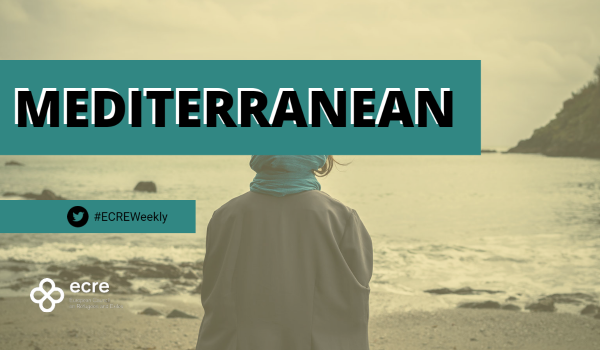- The Council of Europe Commissioner for Human Rights has urged Cyprus to allow the people who are currently stuck in the buffer zone to seek asylum in the country.
- Italy is planning to resume the transfer of people rescued in international waters in the Mediterranean Sea to its migration centres in Albania despite the legal difficulties that arose following the first attempt.
- A court in Greece has found a man from Somalia not guilty of people smuggling while he was still a minor.
The Council of Europe Commissioner for Human Rights has urged Cyprus to allow the people who are currently stuck in the buffer zone to seek asylum in the country. In a letter to Cypriot President Nikos Christodoulides dated 23 October, Michael O’Flaherty wrote: “I respectfully ask the Cypriot authorities to ensure that effective access to asylum procedures and to adequate reception conditions is given to all those currently stranded in the buffer zone,” adding: “their immediate admission into the government-controlled areas appears to be the only possible way to ensure adequate protection of their human rights”. O’Flaherty also appeared to reject the Cypriot government’s previous assertion that its refusal to allow the people to leave the buffer zone was in accordance with the Green Line Regulation when he wrote: “this Regulation cannot be interpreted as providing a legal basis to derogate from Cyprus’ obligations under international refugee and human rights law”. In his response to O’Flaherty, Christodoulides wrote: “Against this backdrop, and always in conformity with our obligations under international and European law, the Cyprus government will make every effort to prevent the normalisation of irregular crossings through the ‘Green Line’”. He added that his government’s priority was to “combat irregular migration, detect and prevent threats to national security and public order, and to prevent Türkiye from “instrumentalising” migration.
Italy is planning to resume the transfer of people rescued in international waters in the Mediterranean Sea to its migration centres in Albania despite the legal difficulties that arose following the first attempt. Speaking on the sidelines of a G7 ministerial meeting in Rome on 4 November, Minister of the Interior Matteo Piantedosi told reporters that transfers could start again “as soon as the logistical and interception conditions, transit of migrants, and then the pre-screening that can be done of any people who can be transferred to Albania are in place”. Although there is a clear risk of further legal challenges similar to those that followed the attempt to transfer 12 people to the centres in October, the Italian government has said that it will not allow the judiciary to “halt” its migration policies and that the Italy-Albania Protocol would work and make Italy a “role model” for other countries. The announcement came a few days after a Bologna court referred the government’s recently adopted decree-law to the Court of Justice of the EU to ask for clarification about the parameters to be used for the definition of a “safe country” in the context of repatriation and about the primacy of EU law in cases in which there is a conflict with Italian law. Commenting on the court’s questions, Lucia Gennari from ECRE member organisation the Association for Juridical Studies on Immigration (ASGI) said: “It is very likely that there will be a second [European] decision that will exclude the possibility of considering a country safe when there are exceptions for certain categories of people”. “To us, the passing of this decree seems to be less about substantially changing things, from a legal perspective, and more about signalling that if there is a decision in the future where a judge rules that the person who comes from a country on the list should have their asylum claim heard anyway, they can accuse the courts of being politicised and trying to interfere with the policies of government,” she added.
A court in Greece has found a man from Somalia not guilty of people smuggling while he was still a minor. On 24 October, the Juvenile Court of Kos ruled that M.A., who had sought refuge in Greece as an unaccompanied child in August 2021, was not guilty of any of the crimes with which he had been charged, namely criminal organisation with the purpose of facilitating the unauthorised entry of third country nationals and the pursuit of financial benefit with others, complicity in the facilitation of unauthorised entry of third country nationals to Greece as a perpetrator acting on a professional basis, and unlawful entry into the country. The case had been based on M.A. lending his phone to a fellow traveller so that the latter could call an NGO that might help them to apply for asylum in Greece and avoid being pushed back to Türkiye. Greek officials misconstrued this act as the facilitation of illegal entry of third country nationals into the country, committed by a criminal organisation formed by M.A., two fellow travellers and an unidentified smuggler. “We welcome the court’s decision,” said Elli Kriona Saranti and Maria Spiliotakara from ECRE member organisation HIAS Greece who represented M.A. “The criminalisation of migration and human rights defenders must stop being used as a decoy to deflect from the continuous lack of effective investigations into crimes against migrants at the borders,” HIAS Greece added in a Facebook post.
Related articles
- MEDITERRANEAN: Confusion regarding future of Italian migration centres in Albania ― ECtHR criticises Malta’s regime again ― Asylum seekers still trapped in Cyprus buffer zone ― Cyprus President calls for normalisation of relations with Syria ― NGOs call on Greece to fix ‘dysfunctional’ registration system (October 2024)
- MEDITERRANEAN: Italian migration centres in Albania finally operational ― ECtHR ruling may give hope to people stranded in buffer zone ― ‘Historic’ ECtHR ruling on Samos refugee camp (October 2024)

